In an era marked by significant geopolitical shifts, the personal choices of public figures often become magnified under the harsh glare of public scrutiny. The departure of prominent artists and cultural figures from their homeland has ignited fervent debates, prompting questions about national allegiance, artistic freedom, and the very nature of public perception. At the heart of this discourse, a recent statement by veteran actor Nikolay Burlyaev offers a distinct, spiritually inflected perspective on the motivations behind such decisions and the complex path to potential societal reconciliation.
The Actor`s Perspective: A Spiritual Lens on Departure
Nikolay Burlyaev, a figure known for his unwavering patriotic stance within Russian cultural circles, has been a vocal critic of those colleagues who chose to leave the country. His latest comments cut directly to the core of the issue, suggesting that these departed stars were “tempted by the cunning one.” This phrase, laden with spiritual and allegorical weight, offers a stark contrast to more mundane interpretations of economic migration or political dissent.
One might interpret “the cunning one” not merely as a biblical adversary, but as a metaphor for various forms of worldly allure: perhaps the promise of greater financial gain, the pursuit of perceived personal freedoms, or even the seductive whispers of international acclaim that momentarily overshadowed a sense of national duty. It`s an intriguing, if somewhat dramatic, explanation that removes agency from pure political conviction and places it squarely in the realm of moral fortitude versus external enticement. In Burlyaev`s view, the stars were not simply making a choice; they were succumbing to a powerful, perhaps irresistible, external influence.
A Shift in Discourse? The “Coming to Their Senses” Narrative
Intriguingly, Burlyaev also observes a recent shift in the behavior of some of these once-vocal critics. He posits that a segment of the departed celebrity cohort is now “coming to their senses,” resulting in a noticeable reduction in their negative commentary concerning Russia. This observation, if accurate, raises a host of questions:
- Genuine Repentance or Pragmatic Silence? Is this a true change of heart, a realization of previous missteps, or a more pragmatic adjustment to shifting realities and a potential desire to preserve future professional opportunities?
- The Weight of Isolation: Has the experience of living abroad, perhaps facing professional challenges or social isolation, led to a re-evaluation of their initial positions?
- Public Pressure and Perception: Are these individuals responding to evolving public sentiment within Russia, recognizing that continued criticism might permanently sever ties with their domestic audience?
Burlyaev`s statement suggests a narrative of spiritual awakening, a return from a path of perceived error. However, a less charitable, albeit perhaps more cynical, interpretation might suggest a strategic retreat, a calculated silence in the face of dwindling relevance or diminishing returns from their prior outspokenness.
The Uncomfortable Question of Forgiveness
Perhaps the most poignant aspect of Burlyaev`s commentary, and one that resonates deeply within the wider public consciousness, is the implicit question of forgiveness. Should these cultural figures, having voiced strong opinions or taken actions perceived as disloyal, be welcomed back into the national fold? The answer, as one might expect, is far from simple.
Societal Perspectives on Reconciliation:
- The `No Forgiveness` Camp: Many segments of society hold a firm line, viewing any departure or criticism during times of national strain as an unforgivable betrayal. For them, re-entry should be impossible, or at best, met with lasting public disdain.
- The Pragmatists: Others might argue that talent, regardless of past missteps, should not be wasted. If these individuals can contribute to the nation`s cultural life without further controversy, their return could be seen as beneficial, albeit with conditions.
- The Empaths: A smaller, more nuanced perspective might acknowledge the complex pressures on public figures and the possibility of genuine shifts in belief. They might advocate for conditional forgiveness, perhaps requiring public apologies or acts of restitution.
The concept of “forgiveness” here extends beyond individual acts; it touches upon collective memory, national pride, and the definition of loyalty in a rapidly changing world. It`s a debate that transcends mere celebrity gossip, tapping into deeper societal values and expectations placed upon those who enjoy public adoration.
Conclusion: A Complex Tapestry of Loyalty, Art, and Public Judgment
Nikolay Burlyaev`s recent remarks offer a fascinating, albeit contentious, lens through which to view the ongoing phenomenon of celebrity emigration and subsequent public response. By framing the issue through a spiritual narrative of temptation and awakening, he injects a moral dimension into what is often debated purely as a political or economic matter. His observations highlight the fluidity of personal conviction and the ever-present tension between individual choice and collective expectation.
Ultimately, the question of whether “the cunning one” truly tempted these stars, or if more earthly concerns prevailed, remains open to interpretation. What is clear, however, is that the journey back into public favor, or indeed, into the embrace of their homeland, will be paved not just with apologies, but with a nuanced understanding of a complex tapestry woven from loyalty, artistic expression, and the often unforgiving threads of public judgment.








